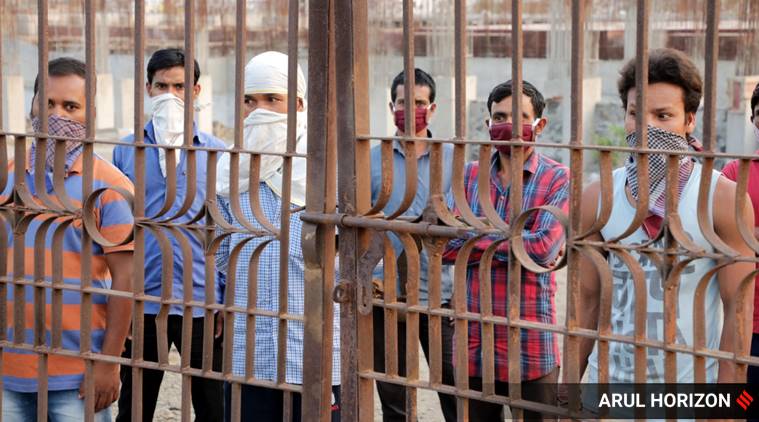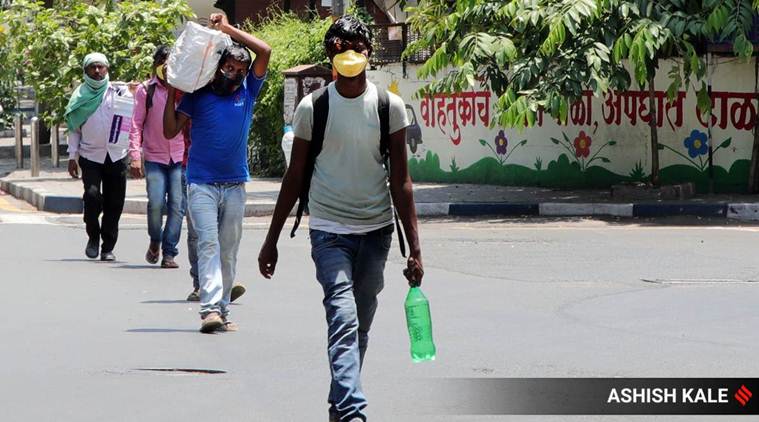11 crore jobs, 30% of GDP: Small enterprises pushed to brink amid looming distress, despair
From a Delhi-based machine-part manufacturing enterprise which can’t pay its 24 workers to a paint-maker in Pune fresh out of insolvency but facing a funds crunch, a start-up which got a Rs 90-lakh order to make masks but is waiting for banks to give credit, to a Ludhiana export unit whose bills haven’t been cleared — no other sector has been pushed so far to the edge by the pandemic and the Covid lockdown as Micro, Small and Medium Enterprises (MSMEs).
These make up the heart of the larger industrial ecosystem, acting largely as ancillary units for the big enterprises, and employ, across 5 crore units, an estimated 11 crore persons
At stake are not only these jobs but the future of what makes up 45 per cent of the country’s total manufacturing output, 40 per cent of exports — and almost 30 per cent of the national GDP.
No wonder then that within the government, officials said, a second stimulus will be more targeted to this sector — rather than large corporates — as the MSME sector has not quite benefited from the series of relief measures announced earlier.
Over the last fortnight, the government has been holding discussions for the last two weeks to finalise a package for MSMEs. Addressing a webinar by FICCI Ladies Organisation Saturday, Union MSME Minister Nitin Gadkari said, “We have sent recommendations for a relief package to the Finance Minister and Prime Minister and I hope it will be announced soon. We will try to give relief to the extent possible.” A week ago, Gadkari had alluded to a Rs 1-lakh-crore revolving fund for MSMEs to provide them liquidity.
As they wait for this package, MSMEs are bleeding.
An illustrative case is that of Jatinder Singh, 45, who owns three units in east Delhi’s Jhilmil Industrial sprawl that make special-purpose machine parts used in assembly lines. Just before the lockdown, Singh, who has 24 workers in these three units, wrapped up an order for Rs 25 lakh for a customer in Uttar Pradesh.
The order can’t be dispatched, his units are shut, there is no word on when and how the lockdown will ease. “I have to pay a fixed electricity cost of Rs 2 lakh, which will keep adding every month. I have eight workers who were paid in rations. Their March payment was made. I don’t know if workers will return after going through all this,” he said.
Singh’s plight reflects that of millions of others who make up India’s most economically vulnerable enterprise grouping. Their problems are multi-fold: from the break-down of the credit cycle, lack of availability of working capital to paying salaries and fixed costs even as units are shuttered, and an inability to even encash their assets to maintain solvency.
 Migrant workers waiting in queue for registration to go back at their native states in Chandigarh
Migrant workers waiting in queue for registration to go back at their native states in Chandigarh
Add to this the huge question mark over labour availability as and when the lockdown opens given that most of them employ migrants who are either stranded in camps or scrambling to return home.
Many MSME promoters The Indian Express spoke to are anguished and despairing. They say the third lockdown gives no clear indications on whether MSMEs will be allowed to operate at full strength or not – and this uncertainty could wreck the sector.
“The most important thing is that now nobody will think of starting a new business, especially in the manufacturing sector. An SME or MSME does not have surplus money to take care on a rainy day,” said Chandrakant Salunkhe, founder and president of SME Chamber of Commerce.
Since a large number of state capitals have been classified in red zones, this is also a huge stumbling block for MSME owners to find the points for sales across sectors.
“Partial work resumption is not going to be helpful as one will not be able to invoice the activities, even if I keep the economic activity alive because production can happen but selling points are not open. Many state capitals are not green zones and most things happen from the capitals,” said K E Raghunathan, Chennai-based SME owner and former National President, All India Manufacturers’ Organisation.
Even those operating in the essential item segment also seem to be impacted. Despite being considered essential services, pharmaceutical MSMEs have reported facing serious issues with arranging accommodation for their workforce, as they do not have the infrastructure or money for it.
MSMEs in India are a heterogeneous group in terms of size and structure of units, products and services offered, their scales of production, and the use of technology, with a considerable number of them falling in the unorganised sector.
 Lack of adequate working capital is the biggest challenge for MSMEs and SMEs
Lack of adequate working capital is the biggest challenge for MSMEs and SMEs
Even as the government is working on a new definition of MSMEs, the present classification for the manufacturing sector designates a micro enterprise as one with investment in plant and machinery not exceeding Rs 25 lakh, small enterprises with investment between Rs 25 lakh-Rs 5 crore and medium enterprises with investment between Rs 5-10 crore.
For service sector classification, micro enterprises have investment in plant and machinery not exceeding Rs 10 lakh, between Rs 10 lakh and Rs 2 crore for small enterprises and Rs 2-5 crore for medium enterprises.
A benchmark survey of 112 representative MSMEs conducted by the Mumbai-based SP Jain Institute of Management Research (SPJIMR) just ahead of the first lockdown revealed an across-the-board underestimation of the scale of the pandemic.
Given the unfolding distress now, all SMEs are trying desperately to cut costs, and the first casualty would be a cut in labour, said Tulsi Jayakumar, professor of Economics and Chairperson, Family Managed Business, at SPJIMR, Mumbai.
“Since the lockdown, a number of the respondents have expressed their desire to downsize, as soon as the lockdown ends. They have also been exploring legal dimensions of salary cuts, freezes, use of force majeure in their contracts.
The biggest problem is that of cash flows, as also the government directive to pay wages,” Jayakumar told The Indian Express.
The largest item constituting financial burden, the respondents said in the survey, was labour costs (34 per cent), followed by raw material (18.8 per cent) and interest on loans (18.8 per cent).
In the MSME services sector, hotels and restaurant segment is among the worst impacted, with an estimated 7.3 million jobs on the line as the third phase of the national lockdown kicks in.
The challenges for this sector range from supplies to labour, real estate to credit, overheads and utilities, delivery commissions and rental contracts. More so, when urban centres that fuelled this sector’s rapid growth are the worst hit and continue under lockdown.
Even in essential services like medicine, MSMEs are no better off.
 The largest item constituting financial burden, the respondents said in the survey, was labour costs (34 per cent), followed by raw material (18.8 per cent) and interest on loans (18.8 per cent).
The largest item constituting financial burden, the respondents said in the survey, was labour costs (34 per cent), followed by raw material (18.8 per cent) and interest on loans (18.8 per cent).
“Under lockdown conditions, transporting our workers while maintaining social distancing is adding to our costs and this is very difficult, especially with a reduced level of production,” said Ashok Madan, ED, Indian Drug Manufacturers’ Association (IDMA), adding that this is a burden for the 7,000 MSME pharma units across the country.
While RBI data shows that the credit outstanding to the sector has contracted, many economists said credit availability may further tighten with banks turning more risk averse now. RBI Governor Shaktikanta Das on Saturday held a video conference with private and state-owned bankers to discuss credit flows including provision of working capital post lockdown to MSMEs.
Notwithstanding such exhortation by RBI, Milind Kamble, founder of Dalit Indian Chamber of Commerce and Industry (DICCI), said banks have been reluctant in extending credit to MSMEs. “A six-month startup, which got an order for supplying masks worth Rs 90 lakh was not extended credit by the bank, despite it being a maker of essential products.
Lack of adequate working capital is the biggest challenge for MSMEs and SMEs,” he said.
D K Joshi, chief economist at Crisil said that while the government in its first stimulus focused on distribution of food grain and cash transfer in bank accounts of poor and needy, the next one has to address this sector.
“We feel that the focus of the next set of stimulus should be around small and medium enterprises so as to support their survival as they are the biggest job creators,” said Joshi. He pegged the stimulus to the tune of Rs 3.5 lakh crore is required, including what has already been announced by the Finance Minister.
INDIAN EXPRESS





